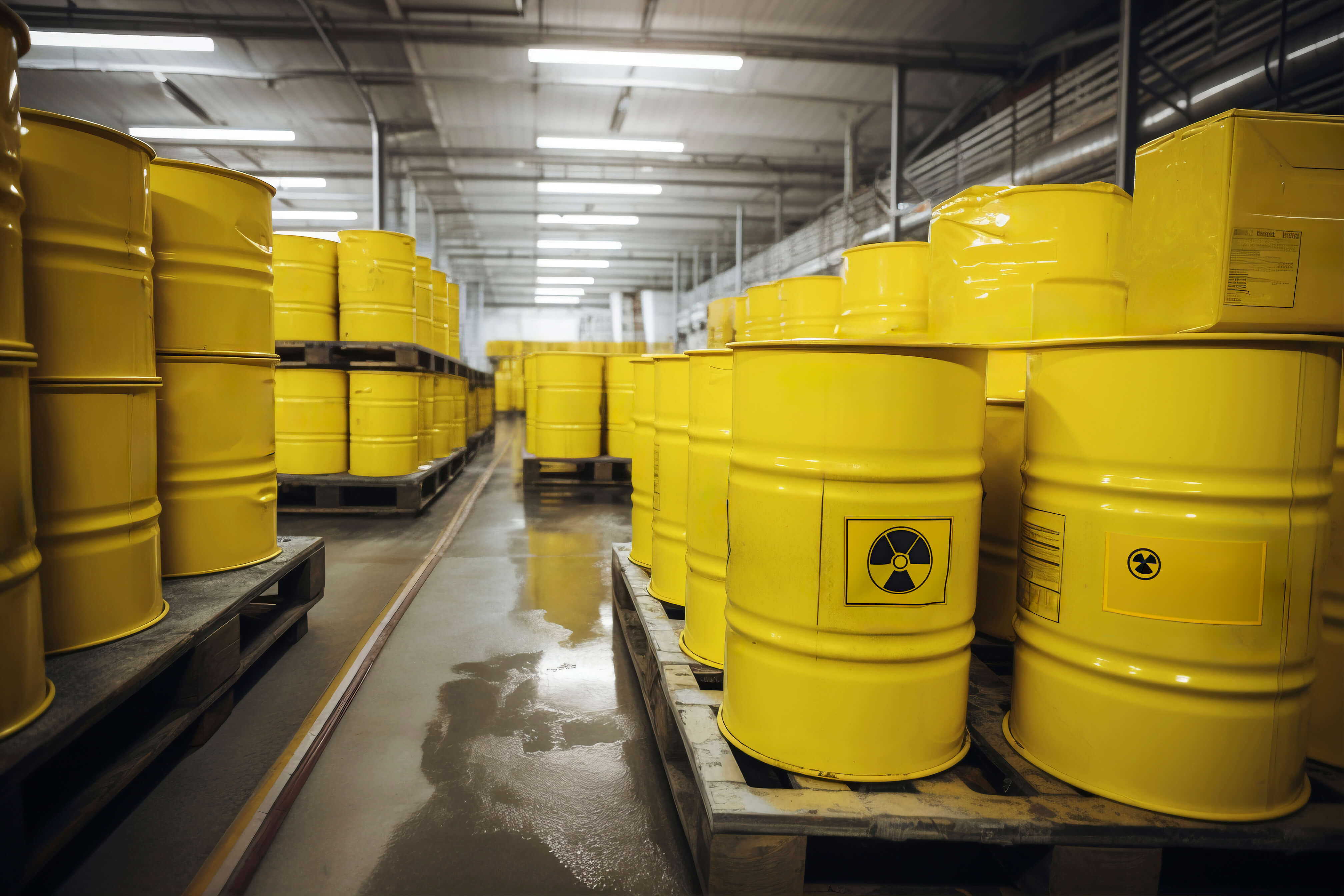Soda Ash- Na2CO3 (CAS# - 497-19-8)
Soda Ash also known as sodium carbonate, is
utilized in the manufacturing of glass, including flat glass for windows and
glassware. Additionally, it serves as a crucial ingredient in the production of
detergents and other cleaning products, acting as a pH regulator and water
softener. In industrial processes, soda ash is used for water treatment,
metallurgy, and in the manufacturing of chemicals such as sodium bicarbonate
and sodium silicate.
Caustic Soda - NaOH (CAS# - 1310-73-2)
Caustic soda plays a crucial role in paper
and pulp manufacturing by breaking down lignin and separating cellulose fibers.
It is also employed in the textile industry to mercerize cotton, improving its
strength, luster, and dye affinity. Additionally, it finds extensive use in the
chemical industry for producing detergents, soaps, and synthetic fibers.
Liquid Chlorine - Cl2 (CAS# - 7782-50-5)
Liquid chlorine is essential for disinfecting
water in treatment plants and pools, as well as sanitizing surfaces in food
processing. It's a key ingredient in chemical manufacturing, bleaching textiles
and paper, and producing PVC for construction. Additionally, it's used in
medical settings for wound disinfection and in the synthesis of pharmaceuticals
and agrochemicals.
Liquid Bromine - Br2 (CAS# - 7726-95-6)
Liquid Bromine, it serves as a crucial
component in flame retardants, particularly in textiles and plastics, ensuring
fire safety. In agriculture, it acts as a pesticide and soil fumigant, aiding
in crop protection and soil health. The pharmaceutical industry utilizes it in
drug manufacturing processes. In water treatment, bromine-based compounds
function as effective disinfectants, ensuring water purity. In the oil and gas
sector, it's utilized in drilling and completion fluids for well maintenance.
Additionally, it plays a role in the production of dyes, medicines, and
photographic chemicals.
Aluminium Fluoride - AlF3 (CAS# - 7784-18-1)
Aluminium fluoride, or aluminum trifluoride, is
used in aluminum production to lower the melting point of alumina, in ceramics
manufacturing to improve firing properties, in the glass industry to enhance
optical and mechanical properties, as a catalyst in chemical reactions, in
pharmaceutical synthesis, and in various other industries including abrasives,
welding fluxes, and aluminum alloy production.
Calcium Carbide - CaC2 (CAS# - 75-20-7)
Calcium carbide is primarily utilized for
producing acetylene gas, crucial in various industries. It's essential in
welding and cutting processes and historically used in carbide lamps.
Additionally, it has applications in desulfurization in the steel industry and
limited use in fruit ripening and soil treatment. Overall, its main role lies
in providing acetylene gas for diverse industrial purposes.
Carbon Black - C (CAS# - 1333-86-4)
Carbon Black, a versatile fine black powder,
is extensively used across industries. It's a crucial ingredient in tire
manufacturing, enhancing durability and strength. In rubber products, it
improves mechanical properties and UV resistance. Added to plastics, it
enhances conductivity, UV resistance, and color intensity. As a pigment in inks
and coatings, it provides color, opacity, and UV protection. Employed in
electronics for conductivity and EMI shielding, and in construction materials
for strength and durability. It's used in pigments, automotive components,
inkjet printing, and battery manufacturing.
Phenol - C6H5OH (CAS# - 108-95-2)
Phenol serves as a precursor in chemical
production, an antimicrobial agent in disinfectants, a key component in
adhesives, and a versatile ingredient in pharmaceuticals and industrial
processes, while also being utilized as a preservative in cosmetics.
Methanol - CH3OH (CAS# - 67-56-1)
Methanol, a versatile alcohol, has diverse
applications. It's used as a fuel additive, solvent, antifreeze, and in
chemical synthesis for producing formaldehyde, acetic acid, and other
chemicals. Additionally, it's utilized in the production of plastics, paints,
adhesives, and pharmaceuticals. In the automotive industry, it's employed in
fuel blending and as a cleaner for windshield washer fluid. Moreover, it serves
as a feedstock for biodiesel production and as a denaturant for ethanol.
Citric Acid - C6H8O7 (CAS# - 77-92-9)
Citric acid is used in the
food and beverage industry, it serves as a flavoring agent, preservative, and
acidity regulator. The pharmaceutical sector utilizes it in formulations like
effervescent tablets and syrups. It's added to cosmetics and personal care
items for its antioxidant properties and pH adjustment abilities. As a
chelating agent, it aids in removing mineral deposits in cleaning products. Its
industrial uses include water treatment, metal cleaning, and as a precursor for
citrate salts production. Overall, citric acid plays a vital role in improving
flavor, extending shelf life, and enhancing functionality in various consumer
and industrial goods.
Hydrobromic Acid - HBr (CAS# - 10035-10-6)
Hydrobromic Acid, it's a vital
component in pharmaceutical manufacturing, aiding in the synthesis of
medications. In organic synthesis, it acts as a reagent for various chemical
reactions. Semiconductor manufacturing utilizes it for etching and cleaning
processes. In petroleum refining, it's involved in alkylation reactions. Water
treatment employs it for pH adjustment and disinfection, while the food and
beverage industry uses it as an acidity regulator and preservative.
Additionally, it's essential for laboratory research and analysis.
Menthol - C10H20O (CAS# - 2216-51-5)
Menthol, derived from mint oils, finds
versatile applications across industries. It's widely used in pharmaceuticals
for its analgesic and cooling properties in topical creams, cough drops, and
throat lozenges. In personal care products, it adds a refreshing sensation to
skincare items, lip balms, and shampoos. Additionally, menthol serves as a
flavoring agent in food and beverages, especially in candies and chewing gum,
providing a minty taste and cooling effect. It's utilized in oral care products
for its breath-freshening qualities and in aromatherapy for its invigorating
scent.
Magnesium Chloride Hexahydrate - MgCl2·6H2O (CAS# - 7791-18-6)
Magnesium chloride hexahydrate serves
multiple purposes across various industries:
It is employed for deicing roads and sidewalks
during winter months, ensuring safer travel conditions. Additionally, it is
utilized for dust control on roads and construction sites, minimizing airborne
particles and improving air quality. In water treatment, magnesium chloride
hexahydrate is used to remove impurities and enhance water quality.
Furthermore, it plays a role in the production of magnesium metal and other
magnesium compounds, contributing to various manufacturing processes.
Calcium Chloride - CaCl2 (CAS# - 10043-52-4)
Calcium chloride serves multiple purposes
across industries: it's a staple deicing agent, preventing ice buildup on roads
and sidewalks while also controlling dust and stabilizing soil on construction
sites. In construction, it accelerates concrete setting and strengthens
structures. Its desiccant properties make it valuable for absorbing moisture in
industrial processes and food preservation. It's commonly added to food for
texture and as a preservative. Additionally, it plays a role in water treatment
by adjusting pH levels and removing impurities. In drilling, it stabilizes
boreholes and controls viscosity. Medicinally, it's used for calcium
supplementation and in treating certain medical conditions.
Limestone - CaCO3 (CAS# - 1317-65-3)
Limestone is
used in construction for buildings and roads, and in manufacturing for cement,
steel, and chemical production. Additionally, it serves as a soil conditioner
in agriculture to adjust pH levels and provide essential nutrients.
Quartz - SiO2 (CAS# - 14808-60-7)
Quartz is a mineral composed
of silicon dioxide (SiO2) found in various forms, including crystalline quartz,
amethyst, and citrine. It is widely used in the production of glass, ceramics,
electronics, and jewelry due to its hardness, transparency, and electrical
properties.
Talc - Mg3Si4O10(OH)2 (CAS# - 14807-96-6)
Talc, derived from the
mineral talc, is widely used in industries such as cosmetics, pharmaceuticals,
and plastics for its softness, lubricating properties, and ability to absorb
moisture. It is commonly employed in products such as baby powder, makeup,
pharmaceutical tablets, and as a filler in plastics and rubber manufacturing.
These products illustrate only a fraction of the bulk chemicals products available, highlighting the vast array of applications and industries dependent on them. If you need information on other specific products, feel free to let us know, and we'll do our utmost to assist you.
Kyanite - Al2SiO5 (CAS# - 1302-74-5)
Kyanite is a mineral
primarily composed of aluminum silicate. It forms elongated, bladed crystals
with varying shades of blue, gray, or green. Kyanite is valued in industrial
applications for its high heat resistance and use as a refractory material, ceramics,
abrasives, metallurgical industry and jewelry.
Asphalt – (CAS# - 8052-42-4)
Asphalt is a mixture of
aggregates, binder and filler, used for constructing and maintaining roads,
parking areas, railway tracks, ports, airport runways, bicycle lanes, sidewalks
and also play- and sport areas. Aggregates used for asphalt mixtures could be
crushed rock, sand, gravel or slags.

.jpg)
